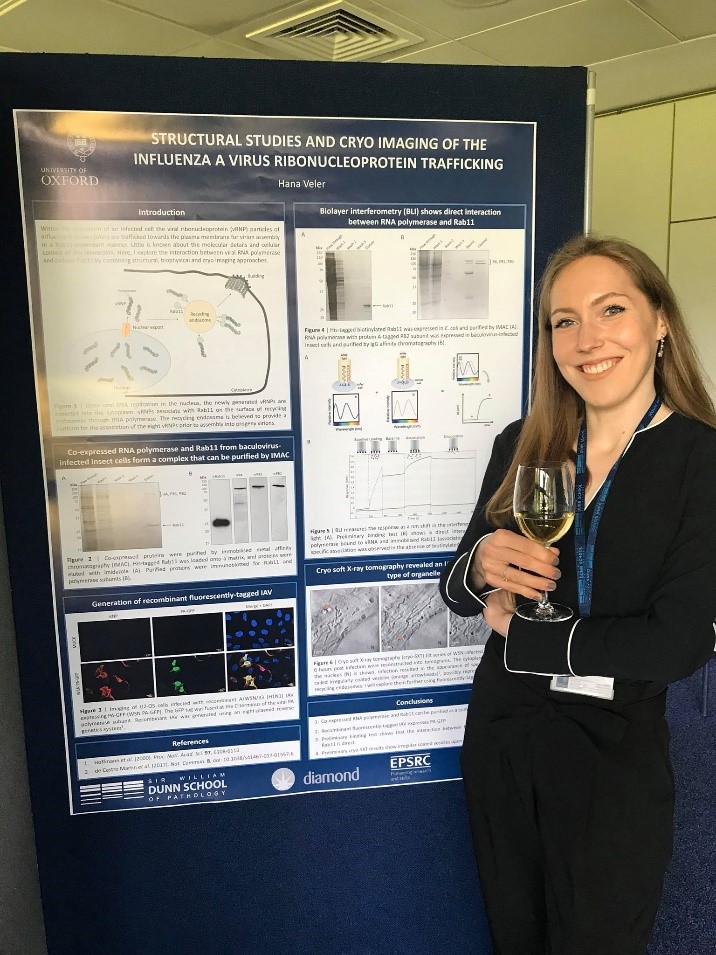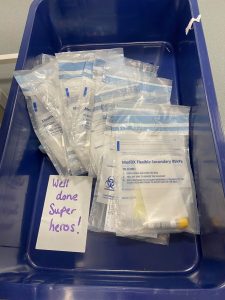
May 22, 2020, by Emma Allaway
Microbiology graduate Hana Veler shares her experience of working at the Lighthouse Lab in Milton Keynes
Written by Hana Veler, Microbiology BSc (Hons) Graduate from School of Biosciences
If I take you back to January, you will see me filled with expectations and motivation to go back in the lab and work on my PhD project. “This will be my year,” I told myself before I said goodbye to my family at the airport, boarding my flight to London. However, since the COVID-19 pandemic happened my life has changed a lot.
I am Hana and I currently work as a COVID-19 diagnostics lab support scientist at the UK Biocentre in Milton Keynes. I graduated top of the class of 2017 from the School of Bioscience with a BSc (Hons) degree in Microbiology and in the same year I started reading for a PhD degree in Systems Approaches to Biomedical Science at the University of Oxford. At the beginning of this year, I was halfway through my PhD project and as soon as I returned in the lab after Christmas break, I started generating lots of data and my experiments finally started working. I was about to start preparing samples for the biggest experiment of my project, which would hopefully give me the most interesting data for my thesis. I was also about to submit an abstract to one of the biggest conferences in my field, which was supposed to happen in Valencia this autumn, but things have quickly changed since we all started facing a public health emergency of international concern on January the 30th 2020.
It was beginning of March this year and I completed my second half marathon in Cambridge, which was only a warmup for the full one, which was supposed to happen in April. It was week like any before and I came to our group’s weekly meeting this Monday after half marathon with a medal around my neck. “Hana, you have generated quite lots of data that you could process from home in case we need to start working from home. Maybe it would be good getting them all on your hard disk and start thinking of spending some time at home, processing and catching up on the literature,” said my supervisor that day when we were discussing my progress, and everyone else in the lab was told something similar eventually that week. Working from home, for a while; maybe for a week or two, or maybe for a month? No one knew.
Mid-March soon became mid-April and I have got no idea where all this time went! During this time, I moved to Cambridge to live with my boyfriend. The idea of living together and not needing to take a 3-hour long train to only see him for the weekend was fantastic and worth everything that I have left behind in Oxford. David and I kept motivating each other to work on our PhDs but let us be honest – our productivity suffered more each additional week of a lockdown. I was tired of looking at the computer screen and sitting all day long; I am the kind of person who goes through days by having a routine and I found a lockdown anything but easy. After a month of a lockdown, I received an e-mail from my supervisor who encouraged me to apply to the UK Biocentre in Milton Keynes, one of three mega-labs known as “Lighthouse Labs” built to scale up COVID-19 testing in the UK. Having completed a degree in Microbiology and as a PhD student in biology, I had all necessary skills to apply. Full of enthusiasm and excitement I convinced David to apply with me; we completed an online application, sent our CVs and references. In less than a week, we received a call to interview us before making the final selection of candidates. “Why would you like to volunteer?” asked me a male voice on the other line. My answer was clear –I feel very useless sitting at home and working on my PhD project, which can be hardly done remotely, knowing that I have the skills with which I could be helping others in the current situation. I wanted to go back in the lab and use the knowledge of pipetting, if nothing else, to help the people. Nonetheless, I believe that this is something that each scientist should strive for in their career. All the money that the government pays for my education, it was not the time to give something in return!
After successfully completed interview, David and I started working in the biggest Lighthouse Lab in the country. It is a large industrial park in Milton Keynes, about an hour drive from Cambridge. It is of an impressive size. Before the pandemic, it used to provide world leading sample management and high capacity bioprocessing for UK medical research. During the pandemic, it redeployed its staff into either laboratory, logistics or back office functions, and it recruited a further 16 people to strengthen back off functions. With the help of the British army and over 200 volunteers, as it has of now, it has 24/7 testing operation. There are about 50 people working at once and there are different stations for the workflow, from samples coming in as a swab and eventually to the RT-qPCR. It is like an assembly line so the work that you are doing can indeed become highly repetitive. As it also does not require any experimental planning and critical thinking as we are used to from academia, scientists can become a bit bored. To avoid this from happening, we regularly rotate in the lab between different stations and we tend to work in different pairs or teams each time.
David and I started working in the day shift team, working on a 12-hour shift from 8am to 8pm, either three or four days a week. In the mid-May our team switched with the night shift team, and we are now working from 8pm to 8am. I have indeed spent on average 10 hours a day in the lab during my PhD; however, working on a 12-hour shift in a COVID-19 diagnostics lab is a completely different experience! All of us came to the Lighthouse Lab in the middle of something very serious and very sad with the same aim – to help. Regardless of the working hours we are doing, we are all working at our bests.
I still remember my very first day when I had the induction during which I was shown nearly all steps of the diagnostics workflow. A day after, I was already set up to start my 12-hour day shift! The very first day was odd; after a month of a self-isolation and working from home, I was now sat in the room with 50 complete strangers. We work in pairs as each step that we do in the lab must be witnessed to avoid making mistakes; there is a human being behind each sample that we process, and this is the biggest difference to the work that I do for my PhD! A month in the lab, I have befriended many other PhD students, postdocs, PIs and other scientists from different universities and research institutions across the country. Regardless of age, level of education and nationality, we are all one team and we all support and help each other. The environment that I come from as a PhD student is hugely competitive and days in the lab can be mentally very stressful and challenging. Here, in the Lighthouse, it does not matter who has already got a PhD degree, who has already published in a high impact factor journal or who is already a well-established scientist in the field. Here in the Lighthouse we are all the same and we all came with the same mission – to stand together to beat COVID-19.

In the instant that you scan your pass at the entrance of the Lighthouse Lab, doors to a new world open to you. A world that is completely different form anything that you knew before the pandemic. Life becomes in a very weird way much simpler and many things that you used to worry about now seem completely irrelevant. When I get asked what will happen with my PhD and if I will get an extension, I say “I do not know, and it does not matter now.” Indeed, it has not yet been confirmed that PhD students who are not in their final year will be eligible to apply for the extension and the additional funding. I even do not know when I will be able to return to Oxford! However, I stopped stressing about this as it surely does not help at all; we are all in the same boat and things will surely work out fine at the end. I feel extremely happy and sort of privileged to have been given the opportunity to be a part of this world pandemics in a different way. I think it will be amazing telling my future kids how David and I faces this world change and how we became frontline workers in the fight against SARS-CoV-2 virus. How in this moment my PhD became irrelevant thing to focus on, and how I have realised that I always had time for gardening and reading nonscientific literature before the pandemic happened, but I just never took some time off from living my life too fast.
No comments yet, fill out a comment to be the first

Leave a Reply